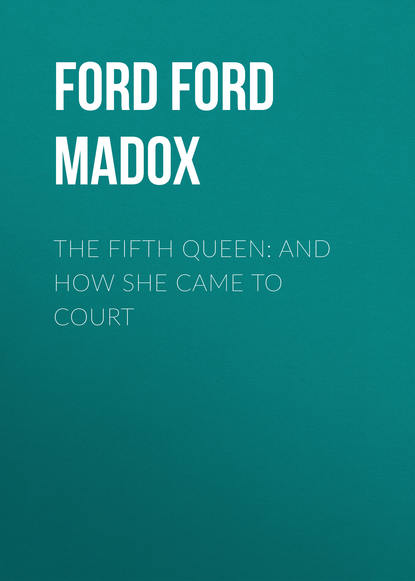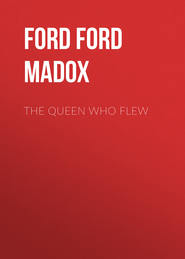По всем вопросам обращайтесь на: info@litportal.ru
(©) 2003-2024.
✖
The Fifth Queen: And How She Came to Court
Настройки чтения
Размер шрифта
Высота строк
Поля
'Ah, dear God have mercy.'
The Archbishop's thin hands wavered before the crucifix on his breast, and made the sign of the cross.
The very faces of his enemies seemed visible to him. He saw Gardiner, of Winchester, with his snake's eyes under the flat cap, and the Duke of Norfolk with his eyes malignant in a long, yellow face. He had a vision of the King, a huge red lump beneath the high dais at the head of the Council table, his face suffused with blood, his cheeks quivering.
He wrung his hands and wondered if at Smithfield the Lutherans would pray for him, or curse him for having been lukewarm.
'Why, goodman gossip,' Cromwell said compassionately, 'we have been nearer death ten times.' He uttered his inmost thoughts out of pity: – All this he had awaited. The King's Highness by the report of his painters, his ambassadors, his spies – they were all in the pay of Cromwell – had awaited a lady of modest demeanour, a coy habit, and a great and placid fairness. 'I had warned the Almains at Rochester to attire her against our coming. But she slobbered with ecstasy and slipped sideways, aiming at a courtesy. Therefore the King was hot with new anger and disgust.'
'You and I are undone.' Cranmer was passive with despair.
'He is very seldom an hour of one mind,' Cromwell answered. 'Unless in that hour those you wot of shall work upon him, it will go well with us.'
'They shall. They shall.'
'I wait to see.'
There seemed to Cranmer something horrible in this impassivity. He wished his leader to go to the King, and he had a frantic moment of imagining himself running to a great distance, hiding his head in darkness.
Cromwell's lips went up in scorn. 'Do you imagine the yellow duke speaking his mind to the King? He is too craven.'
A heavy silence fell between them. The fire rustled, the candles again needed snuffing.
'Best get to bed,' Cromwell said at last.
'Could I sleep?' Cranmer had the irritation of extreme fear. His master seemed to him to have no bowels. But the waiting told at last upon Cromwell himself.
'I could sleep an you would let me,' he said sharply. 'I tell you the King shall be another man in the morning.'
'Ay, but now. But now…' He imagined the pens in that distant room creaking over the paper with their committals, and he wished to upbraid Cromwell. It was his policy of combining with Lutherans that had brought them to this.
Heavy thundering came on the outer door.
'The King comes,' Cromwell cried victoriously. He went swiftly from the room. The Archbishop closed his eyes and suddenly remembered the time when he had been a child.
Privy Seal had an angry and contemptuous frown at his return. 'They have kept him from me.' He threw a little scroll on to the table. Its white silence made Cranmer shudder; it seemed to have something of the heavy threatening of the King's self.
'We may go to bed,' Cromwell said. 'They have devised their shift.'
'You say?'
'They have temporised, they have delayed. I know them.' He quoted contemptuously from the letter: 'We would have you send presently to ask of the Almain Lords with the Lady Anne the papers concerning her pre-contract to the Duke of Lorraine.'
Cranmer was upon the point of going away in the joy of this respite. But his desire to talk delayed him, and he began to talk about the canon law and pre-contracts of marriage. It was a very valid cause of nullity all the doctors held.
'Think you I have not made very certain the pre-contract was nullified? This is no shift,' and Cromwell spoke wearily and angrily. 'Goodman Archbishop, dry your tears. To-night the King is hot with disgust, but I tell you he will not cast away his kingdom upon whether her teeth be white or yellow. This is no woman's man.'
Cranmer came nearer the fire and stretched out his lean hands.
'He hath dandled of late with the Lady Cassilis.'
'Well, he hath been pleasant with her.'
Cranmer urged: 'A full-blown man towards his failing years is more prone to women than before.'
'Then he may go a-wenching.' He began to speak with a weary passion. To cast away the Lady Anne now were a madness. It would be to stand without a friend before all nations armed to their downfall. This King would do no jot to lose a patch upon his sovereignty.
Cranmer sought to speak.
'His Highness is always hot o'nights,' Cromwell kept on. 'It is in his nature so to be. But by morning the German princes shall make him afraid again and the Lutherans of this goodly realm. Those mad swine our friends!'
'He will burn seven of them on to-morrow sennight,' Cranmer said.
'Nay! I shall enlarge them on Wednesday.'
Cranmer shivered. 'They grow very insolent. I am afraid.'
Cromwell answered with a studied nonchalance:
'My bones tell me it shall be an eastward wind. It shall not rain on the new Queen's bridals.' He drank up his warm wine and brushed the crumbs from the furs round his neck.
'You are a very certain man,' the Archbishop said.
Going along the now dark corridors he was afraid that some ruffling boy might spring upon him from the shadows. Norfolk, as the Earl Marshal, had placed his lodgings in a very distant part of the palace to give him long journeys that, telling upon his asthma, made him arrive breathless and convulsed at the King's rooms when he was sent for.
III
The shadow of the King kept hands from throats in the palace, but grooms were breaking each others' heads in the stables till towards morning. They fought about whether it were lawful to eat fish on a Friday, and just after daybreak a gentleman's oarsman from Sittingbourne had all his teeth to swallow for asserting that the sacrament should be administered in the two kinds. The horses were watered by ostlers who hummed the opprobrious song about Privy Seal, called 'Crummock.'
In the hillocks and lawns of the park round the palace Lutherans waited all night to welcome their Queen. They lit small fires on the turf and, standing round them, sang triumphal hymns. A Princess was coming from Cleves, a Lutheran; the day-spring from on high was visiting them; soon, soon now, the axe and the flail should be given into their hands.
In the dawn their boats could be seen pulling like water-beetles all across the pallid river from the Essex shores. They clustered in grey masses round the common steps.
A German horse merchant from the City pulled a putrid cat out of the river mud and held it over his head. He shrieked: 'Hic hocus pocus,' parodying the 'Hoc corpus meum' of the Mass. The soldiers of the Duke of Norfolk were unable to reach him for the crowd. There were but ten of them, under a captain, set to guard the little postern in the side wall of the garden. Towards ten o'clock the Mayor of London came by land. He had with him all his brotherhood with their horses and armed guards in a long train. The mayor and his aldermen had entrance into the palace, but the Duke had given orders that men and horses must bide in the park. There were forty battles of them, each of one hundred men.
The great body came in sight, white, shining even in the grey among the trees along the long garden wall.
'Body of God,' the captain said, 'there shall be broken crowns.' He bade his men hold their pikes across, and paced unconcernedly up and down before the door.
The City men came down in a solid body, and at sight of the red crosses on their white shoulders the Lutherans set up a cry of 'Rome, Rome.' Their stones began to fly at once, and, because they pressed so closely in, the City bowmen had no room to string their bows. The citizens struck out with their silvered staves, but the heavy armour under their white surcoats hindered them. The Lutherans cried out that the Kingdom of God was come on earth because a Queen from Cleves was at hand.
An alderman's charger was struck by a stone. It broke loose and crashed all foaming and furious through a tripe stall on which a preacher was perched to hold forth. The riot began then. All in among the winter trees the City men in their white and silver were fighting with the Lutherans in their grey frieze. The citizens' hearts were enraged because their famous Dominican preacher had been seized by the Archbishop and spirited into Kent. They cried to each other to avenge Dr. Latter on these lowsels.
Men struck out at all and sundry. A woman, covered to the face in a fur hood and riding a grey mule, was hit on the arm by the quarterstaff of a Protestant butcher from the Crays, because she wore a crucifix round her neck. She covered her face and shrieked lamentably. A man in green at the mule's head, on the other side, sprang like a wild cat under the beast's neck. His face blazed white, his teeth shone like a dog's, he screamed and struck his dagger through the butcher's throat.
His motions were those of a mad beast; he stabbed the mule in the shoulder to force it to plunge in the direction of the soldiers who kept the little gate, before in the throng the butcher had reached the ground. The woman was flogging at the mule with her reins. 'I have killed 'un,' he shrieked.
He dived under the pikes of the soldiers and gripped the captain by both shoulders. 'We be the cousins of the Duke of Norfolk,' he cried. His square red beard trembled beneath his pallid face, and suddenly he became speechless with rage.












